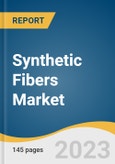The shifting fashion trends coupled with the rising urban population with modern living standards are expected to provide opportunities for high-end polyester fibers. Synthetic Fibers have been extensively used in the textile industry and exhibit superior properties as compared to natural fibers. Thus. The market for Synthetic Fibers is anticipated to grow with the expansion of the textile industry.
Fabrics produced from Synthetic Fibers, such as acrylics, polyester, nylon, and rayon, are used in an array of applications in the clothing segment. These fabrics are strong, durable, easy to dye, & soft, and act as a highly absorbent material. The factors like the digitalization of production facilities and the growing textile industry in emerging economies are expected to surge market growth during the forecasted period.
Asia Pacific is the largest market for Synthetic Fibers, with demand likely to rise throughout the forecast period due to the region's high population density and rising need for Synthetic Fibers products in sectors such as automotive, textile, filtration, and furniture. The region's growing economies, particularly India and China, will see an increase in demand for Synthetic Fibers. The presence of major multinational fashion clothing manufacturers, including H&M, Zara, Dior, Louis Vuitton, Gucci, and Hermès, has increased the demand for branded clothing, which, in turn, is anticipated to benefit the demand for Synthetic Fibers market in the country.
The Synthetic Fibers market exhibits a large number of players in the market resulting in high competitive rivalry. To gain a competitive edge many companies are adopting various strategies such as new product launches, mergers, enhancing portfolios, and adapting various technological advancements.
Synthetic Fibers Market Report Highlights
- The polyester type segment accounted for USD 30.53 billion in 2021 and is projected to grow at a CAGR of 5.0% from 2022 to 2030. The growth can be attributed to its application in the production of textiles, home furnishing, and upholstery.
- The escalating e-commerce industry has provided opportunities to different sports apparel retailers to offer products like sports and gym clothing which are lightweight and have moisture-wicking properties. This is likely to boost the demand for polyester fiber during the forecast period.
- Clothing applications accounted for the revenue share of 46.7% in 2022 on account of the growing demand for gym apparel in the urban population regarding their increasing focus on fitness. The lifestyle improvements and increasing spending capacity of the consumer are further driving the demand for apparel, which is expected to provide growth opportunities to the Synthetic Fibers market. In addition, changing fashion trends coupled with the rising demand for artificial silk are expected to boost the market growth.
- The increase in spending capability of consumers and aspiration for better-looking interiors are projected to boost the need for home furnishings in these regions. The growth in home furnishings is, in turn, expected to result in the growing demand for Synthetic Fibers during the forecast period.
- The Asia Pacific is projected to witness substantial market growth of 5.5% from 2022 to 2030. The apparel and textile industry in the region is expected to witness significant growth in the coming years owing to the increasing infrastructural investments by different governments in large projects that are expected to augment the demand for synthetic textiles.
- Key market players are undertaking mergers and collaborations to expand their reach and increase production capacity, thereby advancing their market share. Additionally, the players are investing heavily in R&D to overcome environmental concerns, since breakthroughs in polyester production and Synthetic Fibers recycling are not a cure for all environmental issues.
Table of Contents
Companies Mentioned
- Bombay Dyeing
- E. I. du Pont de Nemours and Company
- Indorama Corporation
- Lenzing AG
- Mitsubishi Chemical Holdings Corporation
- Reliance Industries Limited
- China Petroleum Corporation (Sinopec Corp.)
- Teijin Limited
- Toray Chemical Korea, Inc.
- Toyobo Co., Ltd.
Table Information
| Report Attribute | Details |
|---|---|
| No. of Pages | 145 |
| Published | April 2023 |
| Forecast Period | 2022 - 2030 |
| Estimated Market Value ( USD | $ 66.11 Billion |
| Forecasted Market Value ( USD | $ 117.76 Billion |
| Compound Annual Growth Rate | 7.4% |
| Regions Covered | Global |
| No. of Companies Mentioned | 10 |









